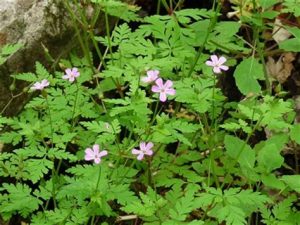
Perennial, spreading plant with small pink flowers.
Other Names: Rau Rau, Rau Ram, Vietnamese Coriander, Lemon Coriander, Daun Laksa
Origin: Asia
Size: 0.5m high, 1m spread
Growing conditions: partial shade to full shade
Harvest: Prune/harvest regularly to encourage bushy growth.
Propagation: root division or cuttings, which easily root in water
Growing tips: Grow in very damp areas, or place pot in water.
Use: Leaves have a hot, pungent, biting flavour and small amounts are great in salads, soups, stews, stir-fries, casseroles, meat and noodle dishes.
Availability in shop: all year

 Pepper, Devil’s Nettle
Pepper, Devil’s Nettle Prune after flowering.
Prune after flowering.
